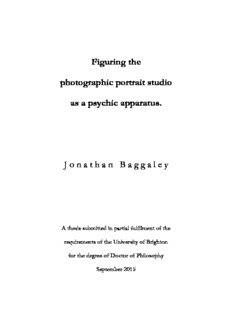
Figuring the photographic portrait studio as a psychic apparatus. J onathan B aggaley PDF
Preview Figuring the photographic portrait studio as a psychic apparatus. J onathan B aggaley
Figuring the photographic portrait studio as a psychic apparatus. J o n a t h a n B a g g a l e y A thesis submitted in partial fulfilment of the requirements of the University of Brighton for the degree of Doctor of Philosophy September 2015 Abstract: 'Figuring the photographic portrait studio as a psychic apparatus.' This research project makes use of photographic art practice as an investigative tool, through which a variety of strategies have been employed in order to picture the traditional photographic portrait studio. The thesis provides both a context within which to understand this art practice and expands upon and develops the themes proposed by it.The history of the photographic studio is presented in traditional narrative form and as a discursive formation; being analysed at two specific junctures within this narrative. This historical and cultural contextualisation allows the studio to be viewed in terms of a space and apparatus that embody particular characteristics. It is suggested that whilst these characteristics are explicitly located within discourses relating to class and aesthetics they also incorporate an implicit psychical dimension. The studio as an apparatus is analysed as constituting particular subject positions. These are discussed in relation to ideas drawn from film theory that utilise Lacanian psychoanalytic concepts. The studio is considered as a space in which the presence of the Lacanian Gaze becomes suggested with particular prominence. As an architecture that embodies the presence of the gaze, the studio is discussed in relation to a number of theories around the nature of space and modernity. The possibility of transference as an element of the studio encounter is also posited. Four artists (Helmut Newton, Jemima Stehli, Broomberg and Chanarin and Christopher Williams) are identified as producing work that critically engages the space of the studio. Analysis of this work serves to develop the arguments made so far and provides an extended consideration of the particular subject object relationships that become played out in the studio. This becomes developed further in relation to commercial portrait practices and is demonstrated through analysis of portraits by Mike Disfarmer and Suresh Punjabi both of whom have been the subject of significant theoretical discussion. The thesis concludes with a reflection on how the practice produced for this research has both been conceived and executed in relation to theory but also on how it can be thought of as providing, in itself, a unique and valuable contribution to knowledge. It is argued that the practice not only makes visible a coercive discourse and psychic economy implicit within the studio but that it also promotes a particularly compelling and pertinent consideration of how the two might be related. Keywords: studio, apparatus, Lacan, Gaze, portrait, backdrop, l’objet petit a, commercial photography, subject, transference. I: P H O T O G R A P H S II: T H E S I S PART I PHOTOGRAPHS
Description: